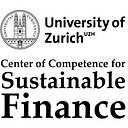Sustainability in Finance as a Guiding Light for a Successful Recovery
2021 is here and it is time to reflect on the milestones reached and the breakthroughs accomplished. Sustainability continued to make its way deeper into the structures and processes of financial actors and institutions, and slowly but surely, the developments that started years ago continued to deepen despite the pandemic. Furthermore, the linkage between globalization, financial imbalances, and the prevalence of pandemics made the case for sustainability with force. Now is the time to bring these insights into action, policy, and further research.
With this newsletter, we share highlights from our recent work. The Center of Competence for Sustainable Finance opens its second year of operations with a track-record consisting of a research seminar reaching more than 300 participants and research outputs tackling topics ranging from AI to the role of the board of directors in mitigating the climate crisis.
Without further ado, I wish you all a good start to the new year and energy for the work done to bring sustainability to practice.
With kind regards,
Professor Marc Chesney
Chair of the Center of Competence for Sustainable Finance
CCSF Contributes to the Upcoming IPCC Report — CCSF researchers Christian Huggel, Veruska Muccione, and Stefano Battiston are deeply engaged in the preparation of the upcoming Intergovernmental Panel on Climate Change or IPCC report. All three are working as lead authors for the 6th Assessment Report to be published in 2022. Veruska and Christian are lead authors in Working Group II on the impacts of climate change and Stefano is a lead author in Working Group III on the mitigation of climate change.
As an example of the progress of their work, the lead authors have finished their Second Order Drafts which are now out for review for the scientific community. Colleagues are encouraged to register as reviewers below!
Working group II
Working group III
The Sustainable Research Seminar Brought Sustainability Scholars from Across the Globe Together — The online Sustainable Finance Research Seminar gave a platform for 12 scholars working in the field of sustainable finance and ranging from Nobel Laureates to researchers from the University of Zurich. Have a look at the program and presented papers here.
Check out the seminar recordings on our YouTube channel
Corporate Climate Responsibility — From Reputational to Liability Risk — Climate change is not only a reputational risk, but increasingly a liability risk calling for adequate corporate governance measures. As per a recent post by Andreas Hösli, the board of directors, overseeing the strategy and risk management of the company, is well-advised to implement measures to ensure solid “Corporate Climate Responsibility”.
Read Andreas Hösli’s blog post on corporate climate responsibility
CLIMATE-FEVER and Climatext available on www.sustainablefinance.uzh.ch — A dataset adopting the FEVER methodology and consisting of 1,535 real-world claims regarding climate-change has now been made available on our website. Each claim is accompanied by five manually annotated evidence sentences that support, refute, or do not give enough information to validate the claim. The dataset is supported by Climatext, a dataset for sentence-based climate change topic detection. The datasets have been created as part of a research project by Markus Leippold, Thomas Diggelmann, Jordan Boyd-Graber, Jannis Bulian, and Massimiliano Ciaramita.
Have a look at the CLIMATE-FEVER and Climatext datasets
Ask BERT: How Regulatory Disclosure of Transition and Physical Climate Risks affects the CDS Term Structure — The paper by Julian Kölbel, Markus Leippold, Jordy Rillaerts, and Qian Wang uses BERT, an AI-based algorithm for language understanding, to decipher regulatory climate-risk disclosures and measure their impact on the credit default swap (CDS) market. Risk disclosures can either increase or decrease credit spreads, depending on whether disclosure reveals new risks or sharpens the signal and decreases the uncertainty. Training BERT to differentiate between transition and physical climate risks, the researchers find that disclosing transition risks increases CDS spreads, while disclosing physical climate risks leads to a decrease in CDS spreads.
Informing Financial Supervisors to Assess Transition Risk — The collaborative report published by the Austrian National Bank and featuring a paper on the bank’s exposure to climate-related transition risk by Stefano Battiston and Irene Monasterolo has been published. The report provides an analysis of climate policy relevant sectors and supports the efforts of financial supervisors to assess and monitor transition risk.
Read the Austrian National Bank’s financial stability report 40, pages 31–44
The Geneva-Zurich Sustainable Finance Research Seminar Looks at Regulation and Green Finance — The first iteration of the Geneva-Zurich Seminar Series on Sustainable Finance zooming in on disclosure and sustainability risks was held on the 12th of November. The seminar recordings featuring Kern Alexander and Xenia Karametaxa and topics such as the recent regulatory developments in Europe and green finance and climate policy are now available. The call for papers for the next iteration of the seminar is currently open and will close on the 1st of February.
Central Bankers and Financial Supervisors Publish Report on Climate Transition Scenarios — A report by the Network of Central Bankers and Financial Supervisors for Greening the Financial System has been published featuring a paper co-authored by Stefano Battiston and Irene Monasterolo. The paper targets practitioners and explains how to translate forward-looking climate transition scenarios into insights on financial shocks and provides investors and financial supervisors with scenario-adjusted risk metrics and models based on the recent stream of scientific work.
Case studies of environmental risk analysis methodologies, pages 52–71
